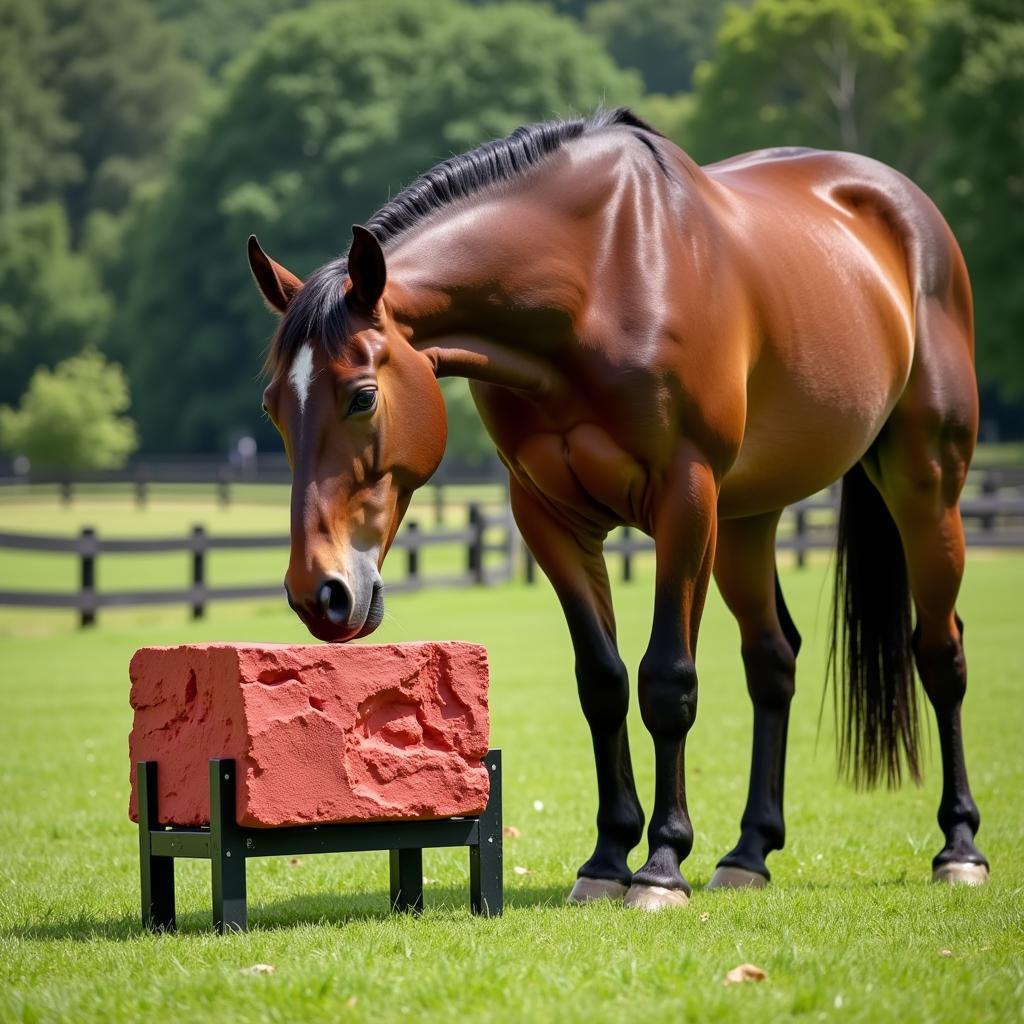A Horse Mineral Block is a vital supplement for your equine companion, providing essential minerals they might not be getting from their regular diet. These blocks offer a convenient and cost-effective way to ensure your horse receives the nutrients they need for optimal health and performance. Let’s delve into the world of horse mineral blocks and discover how they can benefit your horse.
 Horse Licking a Mineral Block in the Pasture
Horse Licking a Mineral Block in the Pasture
Why are Horse Mineral Blocks Necessary?
Horses require a balanced intake of minerals for various bodily functions, including bone development, muscle function, and nerve transmission. Forage and grain alone may not always provide sufficient amounts of all necessary minerals, especially trace minerals like copper, zinc, and selenium. white salt block for horses can also be a good supplement for your horse. A horse mineral block acts as a “free-choice” supplement, allowing horses to regulate their own mineral intake based on their individual needs.
What Minerals Do Horses Need?
Horses require a range of macro-minerals, such as calcium, phosphorus, and magnesium, as well as micro-minerals like copper, zinc, and iodine. Each mineral plays a crucial role in maintaining the horse’s overall health. For instance, calcium and phosphorus are essential for strong bones and teeth, while zinc supports a healthy immune system. Understanding the specific role of each mineral helps horse owners appreciate the importance of a balanced mineral supplement like a horse mineral block.
Choosing the Right Horse Mineral Block
Selecting the right mineral block can be overwhelming, considering the variety of options available. Consider factors such as your horse’s age, activity level, and the mineral content of their existing diet. best mineral block for horses offer a comprehensive solution for your horse’s mineral needs. Consulting with a veterinarian or equine nutritionist can help determine the most suitable mineral block for your horse’s specific needs.
Understanding Mineral Block Composition
Mineral blocks come in various formulations, with different concentrations of macro and micro-minerals. Reading the label carefully and understanding the percentage of each mineral is crucial. You might consider a vitamin and mineral block for horses if your horse requires additional vitamins. For example, horses in heavy work or lactating mares might require higher levels of certain minerals.
“A proper mineral balance is paramount for a horse’s wellbeing,” says Dr. Emily Carter, DVM, specializing in equine nutrition. “A mineral block serves as an excellent tool to supplement their dietary intake and address potential deficiencies.”
Placement and Management of Mineral Blocks
Proper placement and management of mineral blocks are essential to maximize their effectiveness and prevent contamination. Place the block in a clean, dry area, preferably in a sheltered location away from manure and urine. Regularly monitor the block for signs of wear and replace it as needed. Offering multiple blocks in different locations can ensure all horses in a herd have access. You may also want to consider growth supplements for horses for optimal development.
Monitoring Mineral Intake
Observing your horse’s interaction with the mineral block can provide valuable insights into their mineral needs. Some horses may lick the block excessively, while others may show little interest. Excessive licking could indicate a mineral deficiency or an underlying health issue, warranting veterinary attention.
“Overconsumption of a mineral block can be just as detrimental as a deficiency,” advises Dr. Carter. “Monitoring your horse’s intake and consulting with a professional is key to ensuring their nutritional needs are met safely and effectively.”
In conclusion, a horse mineral block is a crucial component of equine nutrition, providing essential minerals that contribute to overall health and performance. Choosing the right block, placing it strategically, and monitoring your horse’s intake are vital steps in ensuring your horse receives the necessary nutrients for a long and healthy life. Don’t overlook the importance of this simple yet effective supplement in your horse’s care routine. Considering alternative pet food options like dog food horse meat can also broaden your understanding of animal nutrition.
FAQ
- How often should I replace a horse mineral block?
- Can a horse overdose on a mineral block?
- What are the signs of a mineral deficiency in horses?
- Are all horse mineral blocks the same?
- Should I offer a mineral block in addition to a balanced feed?
- Can I use a cattle mineral block for my horse?
- How do I choose the right mineral block for my horse?
Common Scenarios & Questions
- Scenario: My horse isn’t touching the mineral block. What should I do?
- Question: Can I offer loose minerals instead of a block?
- Scenario: My horse is licking the mineral block excessively. Is this a problem?
- Question: How can I tell if my horse has a specific mineral deficiency?
Further Reading & Related Articles
- Check out our article on “White Salt Block for Horses”
- Learn more about the “Best Mineral Block for Horses”
- Explore our guide on “Vitamin and Mineral Block for Horses”
For further assistance, please contact us:
Phone: 0772127271
Email: [email protected]
Address: QGM2+WX2, Vị Trung, Vị Thuỷ, Hậu Giang, Việt Nam.
We have a 24/7 customer service team available to assist you.